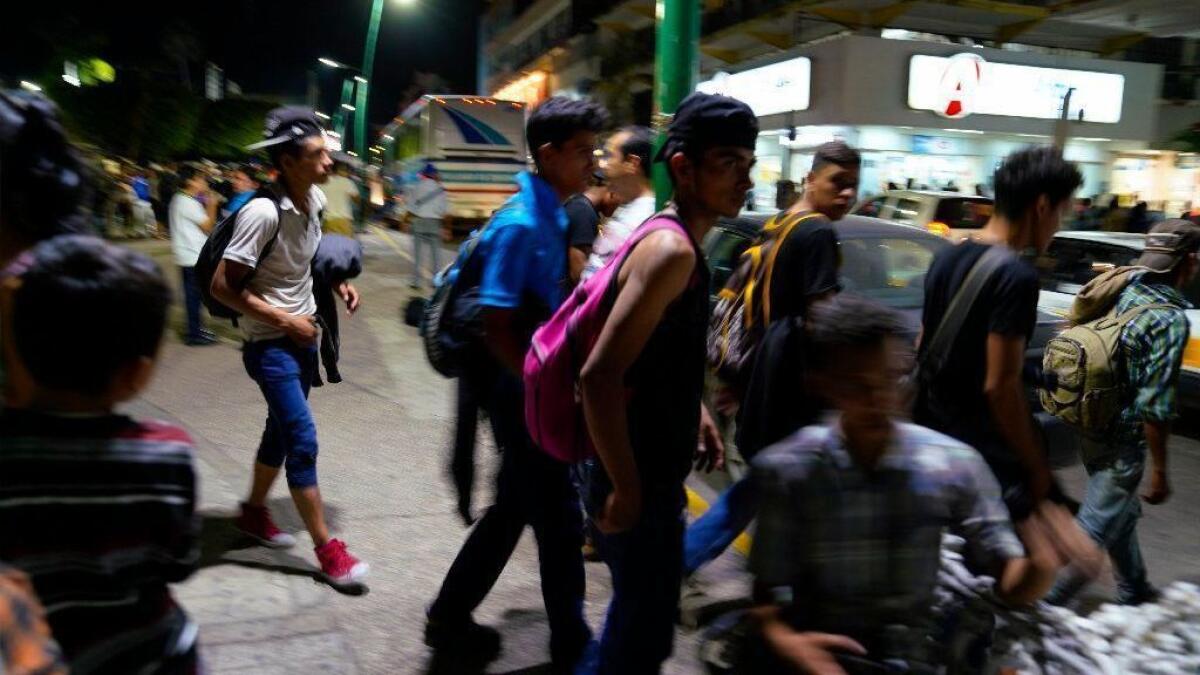Senate Republicans seek to block Central American minors from claiming U.S. asylum unless they apply at home

- Share via
Reporting from Washington — Senate Republicans proposed Tuesday to effectively bar Central American minors from claiming asylum in the United States unless they apply at home, a reversal of U.S. law that Democrats swiftly denounced as unacceptable.
A proposed spending bill introduced by Senate Republicans would amend federal law to bar any Salvadoran, Guatemalan or Honduran younger than 18 from asylum unless they apply first at designated facilities in Central America.
The bill notes that those facilities do not currently exist — and the Homeland Security secretary would have 240 days after the bill’s enactment to open them.
The bill also appears to seek to eliminate judicial review of asylum decisions, saying that “no court or immigration judge” could review Homeland Security’s determinations of who is granted asylum and who isn’t.
Republicans are looking to increase political pressure on Democratic lawmakers following President Trump’s offer Saturday of a supposed compromise to end the month-long partial government shutdown.
Democrats rejected the proposed targeting of Central American children, among others tucked into the massive 1,300-page spending bill that its sponsors said would reopen the government and ensure border security.
“The asylum changes are a poison pill if there ever was one,” said Minority Leader Charles E. Schumer, (D-N.Y.). He said Republicans had conducted no negotiations or consultations with Democrats to produce the proposal.
Majority Leader Mitch McConnell, (R-Ky.) said the Republican-led Senate would vote on the bill Thursday. If it passes intact, it would go to the Democratic-led House, which is sure to reject the provision.
The Senate will also vote Thursday on a House-passed measure to fund the government through Feb. 8, with no border wall funding that Trump has demanded.
Immigration experts and advocates say the asylum application proposal would face stiff legal challenges.
Rep. Zoe Lofgren (D-San Jose), a former immigration attorney, called the bill a “deeply cynical attempt to strip asylees of due process protections and would effectively shut down the asylum process for Central American minors for more than a year, leaving desperate families with no recourse as they continue to face record levels of violence, abuse and even death in their home countries.”
Lindsay M. Harris, a law professor and co-director of the Immigration and Human Rights Clinic, said the proposal violates the Immigration and Nationality Act of 1965, which permits any person physically in the U.S. to claim asylum.
While constitutional rights are limited for immigrants, Harris said, the proposal also may violate protections against race, national origin, ethnicity and age-based discrimination.
“This proposal ignores the reality that El Salvador, Honduras and Guatemala are unable to protect these children from persecution and will not magically be able to do so because the U.S. decides to reopen an in-country processing system,” said Harris. “Children will make the journey north as long as remaining where they are is a threat to their safety.”
In his televised address Saturday, Trump touted “critical measures to protect migrant children from exploitation and abuse,” highlighting what he described as a new system to allow Central American youth to apply for asylum in their home countries.
He did not mention in his address that they would be required to do so, and would be blocked from claiming asylum at the U.S.-Mexico border.
The proposed bill would limit asylum to Central American minors without criminal records, who have not been deported before and who are deemed not to be a risk to “public safety or national security.” They also must have a parent or guardian in the United States who can care for them.
In addition to the so-called Northern Triangle countries of El Salvador, Guatemala, and Honduras, processing centers would be located in Nicaragua, Panama, Belize, Costa Rica and Mexico, according to the bill.
The bill would limit asylum to a maximum of 15,000 Central American minors in any fiscal year. The law would remain in effect for at least three years after it’s enacted.
As written, the proposal seeks “to establish an asylum processing program” outside the United States that “reduces the incentive for such persons to make the dangerous journey to the United States southern border to request asylum.”
The proposal comes as apprehensions of minors entering the country have swelled. In October and November, officials stopped 44% more minors at the border than in the same span a year ago.
In the fiscal year that ended Sept. 30, officials apprehended nearly 50,000 unaccompanied minors, with just under 80 % from Central America.
While refugee status is obtained abroad, migrants can only apply for asylum if physically present in or arriving in the United States, even if it’s not at an official port of entry, according to federal law.
A federal court in November blocked the Trump administration from trying to ban asylum claims between ports of entry.
The Trump administration ended Obama-era programs that allowed, but did not require, Central American minors and their families to apply for U.S. asylum while at home. Thousands of children were stranded when the programs were terminated.
Requiring the minors to apply for asylum in their home countries or region leaves them trapped by the gang violence and other dangers they are trying to escape, said Lorella Praeli, director of immigration policy at the American Civil Liberties Union.
“You can’t condition asylum on people remaining in the place where they are being persecuted,” she said.
More to Read
Get the L.A. Times Politics newsletter
Deeply reported insights into legislation, politics and policy from Sacramento, Washington and beyond. In your inbox twice per week.
You may occasionally receive promotional content from the Los Angeles Times.











